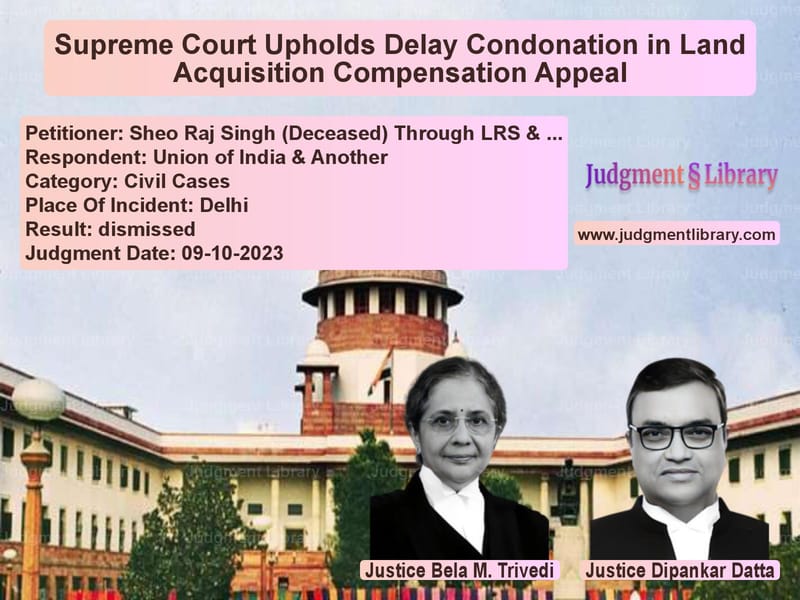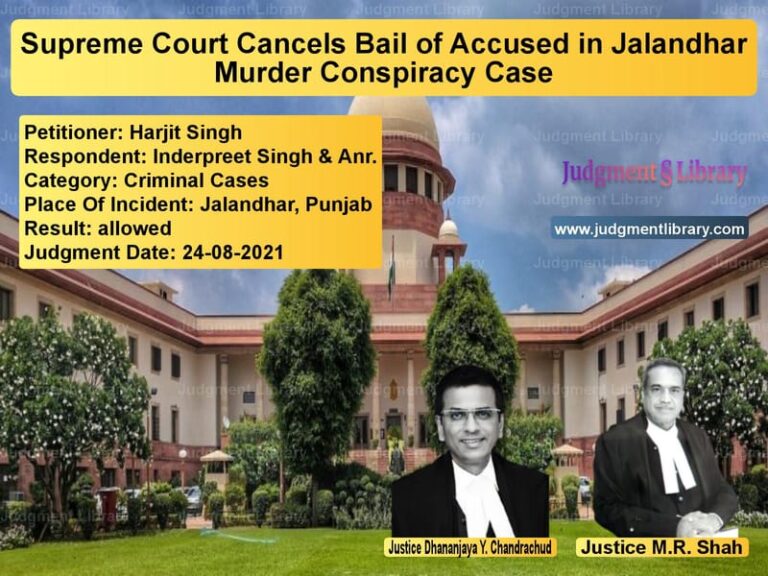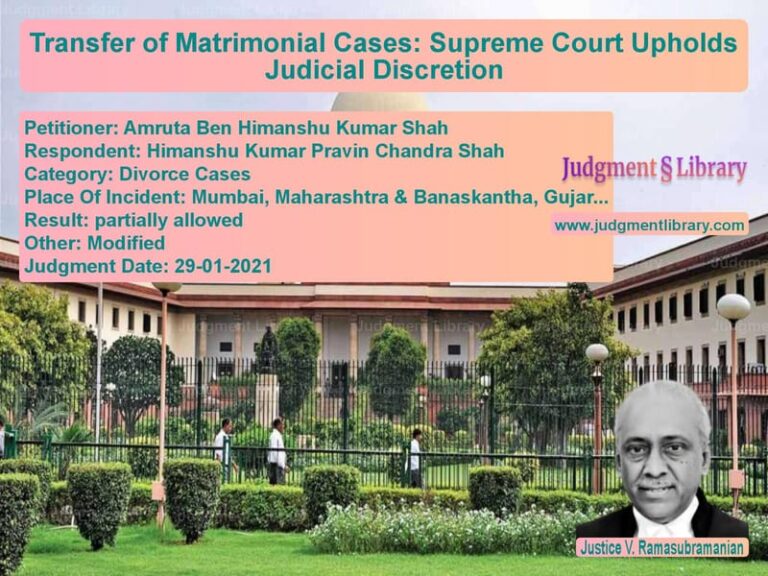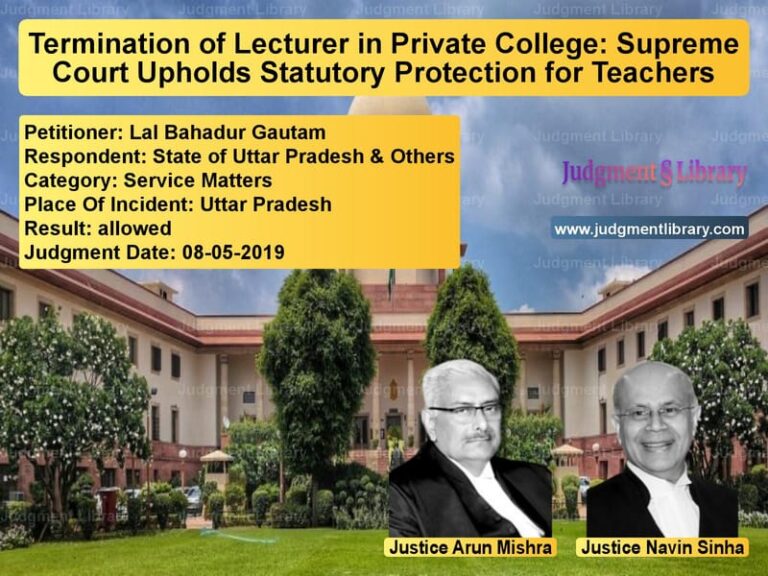Supreme Court Upholds Delay Condonation in Land Acquisition Compensation Appeal
The Supreme Court of India has ruled in favor of the Union of India in a significant land acquisition compensation case, where the delay of 479 days in filing an appeal was condoned by the Delhi High Court. The case highlights the issue of bureaucratic inefficiency, government litigation delays, and the principles governing condonation of delay under the Limitation Act, 1963.
Background of the Case
The case originated from land acquisition proceedings where landowners were awarded enhanced compensation by the Reference Court under Section 18 of the Land Acquisition Act, 1894. The Union of India, dissatisfied with the enhanced compensation, sought to appeal before the High Court of Delhi. However, the appeal was filed with a delay of 479 days. The government then applied for condonation of delay under Section 5 of the Limitation Act, arguing that the delay was due to bureaucratic processes.
The Delhi High Court, while acknowledging the substantial delay, condoned it after imposing a cost of Rs. 10,000 on the government. This decision was challenged by the landowners before the Supreme Court.
Read also: https://judgmentlibrary.com/supreme-court-directs-fresh-adjudication-in-advertisement-tax-dispute/
Key Issues in the Case
1. Whether the High Court was justified in condoning the delay?
The primary question before the Supreme Court was whether the reasons cited by the Union of India were sufficient to justify the condonation of delay.
2. What constitutes ‘sufficient cause’ under the Limitation Act?
The case required an interpretation of the term ‘sufficient cause’ under Section 5 of the Limitation Act, particularly when the applicant is a government entity.
3. The impact of bureaucratic inefficiency on litigation
The court had to consider whether bureaucratic inefficiencies and delays in decision-making within government departments should be a valid ground for condoning delays.
Arguments by the Petitioner (Landowners)
The landowners, through their counsel, argued that:
- The Union of India habitually delays filing appeals and then seeks condonation by citing bureaucratic inefficiencies.
- Such delays are detrimental to landowners who have been awaiting compensation for years.
- The High Court’s decision was arbitrary and inconsistent with past rulings where similar delays were not condoned.
- Government agencies should be held to the same standards as private litigants.
- Allowing such delays to be condoned would set a precedent for future negligence in filing appeals.
Arguments by the Respondent (Union of India)
The government, represented by senior counsel, contended that:
- The delay was unintentional and was caused by the procedural requirements of government litigation.
- Multiple approvals were needed from different departments, which contributed to the delay.
- The certified copy of the judgment was misplaced, necessitating a fresh application, which further delayed the appeal.
- Litigation involving public funds and public interest should not be defeated on technical grounds.
- The High Court rightly imposed costs but allowed the appeal to proceed in the interest of justice.
Supreme Court’s Observations
The Supreme Court analyzed the matter by considering past precedents and the principles governing delay condonation.
On the Importance of Timeliness
The Court acknowledged that delay in filing appeals cannot be condoned as a matter of routine. It emphasized:
“The law of limitation is based on public policy. While courts have the discretion to condone delays in meritorious cases, they must exercise such discretion judiciously.”
On Bureaucratic Inefficiency
The Court recognized that government litigation is often delayed due to multiple layers of decision-making. However, it noted:
“Bureaucratic red-tapism cannot be an excuse for delay. The government is expected to streamline its litigation process and ensure timely filing of appeals.”
On Balancing Justice and Technicality
The Court referred to its ruling in Collector, Land Acquisition, Anantnag v. Mst. Katiji, where it had held that substantial justice should prevail over technical considerations. The Court stated:
“In cases involving public funds, a liberal approach must be adopted to prevent undue enrichment at the cost of the public exchequer.”
On the Conduct of the Parties
The Court found that while there was some negligence on the part of the government, there was no deliberate inaction or lack of bona fide intent.
“While the delay is regrettable, the government did take steps to pursue the appeal, albeit inefficiently.”
Final Judgment
After considering the arguments and past precedents, the Supreme Court ruled as follows:
- The High Court’s decision to condone the delay was upheld.
- The government was directed to streamline its litigation process to prevent similar delays in the future.
- The cost of Rs. 10,000 imposed by the High Court was deemed appropriate.
- The appeal was dismissed, allowing the government’s case to proceed before the High Court on merits.
Conclusion
The Supreme Court’s judgment reinforces the principle that while delays should not be condoned as a matter of course, courts must adopt a balanced approach in cases involving public interest. The ruling underscores the need for government agencies to improve their litigation management while recognizing that procedural delays should not defeat meritorious cases.
Petitioner Name: Sheo Raj Singh (Deceased) Through LRS & Others.Respondent Name: Union of India & Another.Judgment By: Justice Bela M. Trivedi, Justice Dipankar Datta.Place Of Incident: Delhi.Judgment Date: 09-10-2023.
Don’t miss out on the full details! Download the complete judgment in PDF format below and gain valuable insights instantly!
Download Judgment: sheo-raj-singh-(dece-vs-union-of-india-&-ano-supreme-court-of-india-judgment-dated-09-10-2023.pdf
Directly Download Judgment: Directly download this Judgment
See all petitions in Property Disputes
See all petitions in Legal Malpractice
See all petitions in Contract Disputes
See all petitions in Consumer Rights
See all petitions in Damages and Compensation
See all petitions in Judgment by Bela M. Trivedi
See all petitions in Judgment by Dipankar Datta
See all petitions in dismissed
See all petitions in supreme court of India judgments October 2023
See all petitions in 2023 judgments
See all posts in Civil Cases Category
See all allowed petitions in Civil Cases Category
See all Dismissed petitions in Civil Cases Category
See all partially allowed petitions in Civil Cases Category







